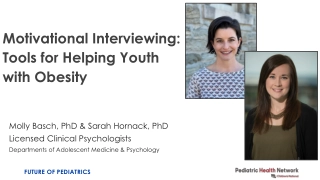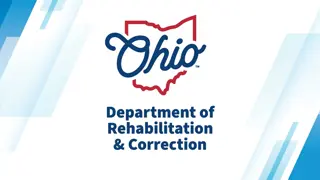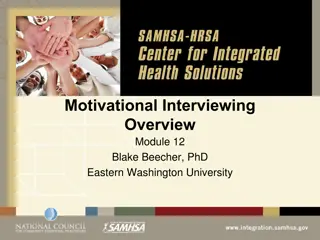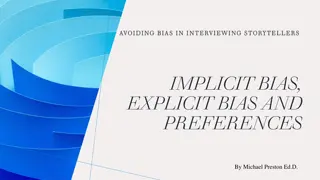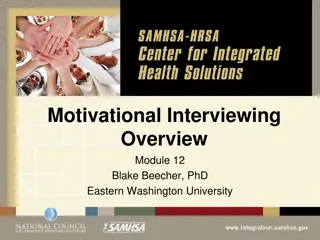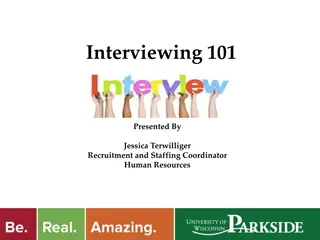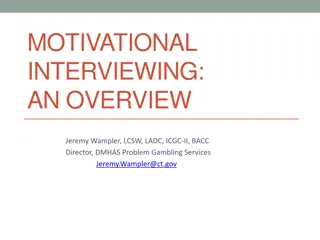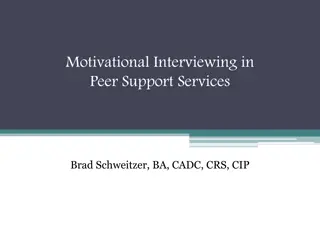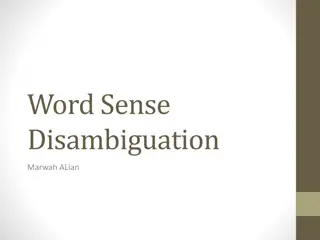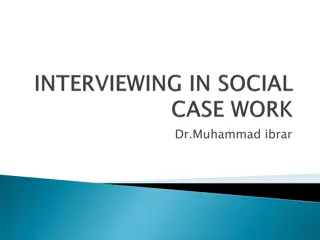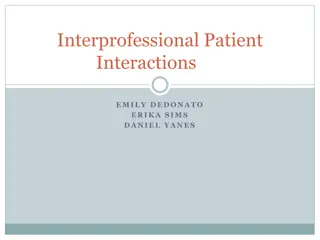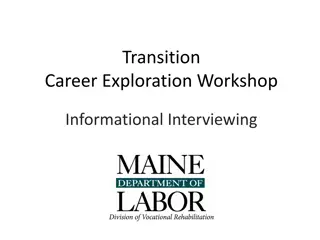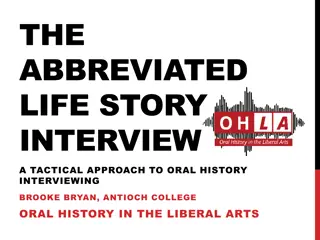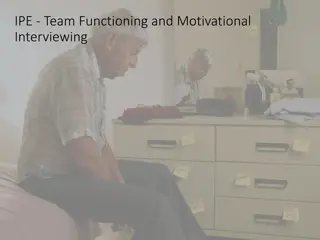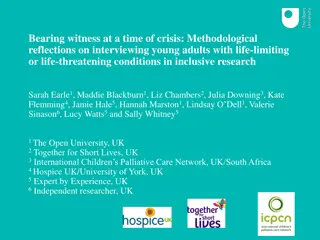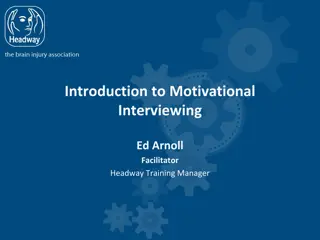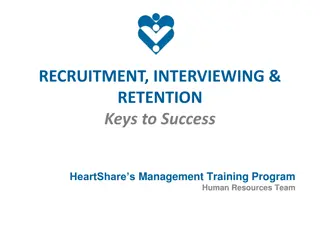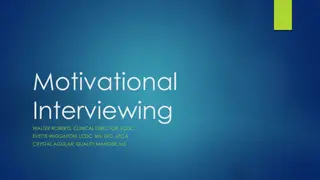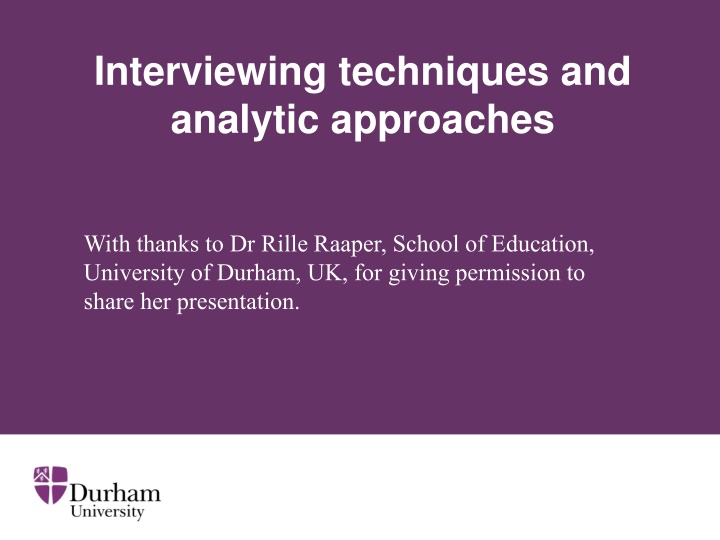
Effective Interviewing Techniques and Analytic Approaches
Explore various interviewing methods, from semi-structured to focus group interviews, with insights on conducting successful interviews and generating valuable data. Learn from Dr. Rille Raaper's expertise at the University of Durham, UK.
Download Presentation

Please find below an Image/Link to download the presentation.
The content on the website is provided AS IS for your information and personal use only. It may not be sold, licensed, or shared on other websites without obtaining consent from the author. If you encounter any issues during the download, it is possible that the publisher has removed the file from their server.
You are allowed to download the files provided on this website for personal or commercial use, subject to the condition that they are used lawfully. All files are the property of their respective owners.
The content on the website is provided AS IS for your information and personal use only. It may not be sold, licensed, or shared on other websites without obtaining consent from the author.
E N D
Presentation Transcript
Interviewing techniques and analytic approaches With thanks to Dr Rille Raaper, School of Education, University of Durham, UK, for giving permission to share her presentation.
Session outline Different types of interviews Basic principles of conducting semi-structured interviews and analytic strategics Group-work will explore further: process of conducting semi-structured interviews experiences of acting as an interviewer and interviewee 2
Interview research is craft, which is learned through practising interviewing (Kvale 2007). 3
Interview method Inter-view: an interchange of views between two or more people about a particular theme. Interview is a specific form of conversation where knowledge is produced through the interaction between an interviewer and an interviewee. (Kvale 2007) 4
Interview method Semi-structured interviews Focused; semi-standardised; problem-centred; expert; ethnographic Narrative interviews Narrative; episodic Focus group interviews Group discussions; focus groups; joint narratives (Flick 2002) 5
Semi-structured interviews A list of guiding interview questions or fairly specific topics to be covered Interviewer and interviewee have a leeway to respond and maneuver within the set framework Set questions ensure consistency between interviews (Bryman 2004/2008) 6
Focus group interviews More than a sum of individual interviews (Morgan 1996, Litosseliti 2003) Social interaction: focus groups have a life of their own (Albrecht, Johnson and Walther 1993) Interviewer as a moderator (Frey and Fontana 1993) Data produced by the focus group method should not be seen as wrong or right or accurate or inaccurate , but as products of those contexts (Smithson 2000, p. 112). 7
Developing interview questions Demographic questions Background questions Descriptive questions Experience questions Behaviour questions Knowledge questions Feeling questions Contrast questions (Cohen et.al. 2011) 8
Processing and analysing interviews Recording Transcription Verification, re-reading the transcript Most commonly: thematic analysis But also: discourse analysis, narrative analysis, content analysis etc. 9
Thematic analysis Bryman (2004/2008) suggests: Stage 1: Reading the text as a whole Stage 2: Reading and marking the text (emerging keywords/codes) Stage 3: Coding the text and grouping the codes to themes Stage 4: Relating themes to the literature/theory Video: https://www.youtube.com/watch?v=7X7VuQxPfpk&t=17s 10
Issues to consider Power imbalance (Kvale 2007; Kvale and Brinkmann 2009) Ethical dilemmas Working with different participant groups (e.g. children, people with additional support needs, language levels) Time and timing Health and safety ... 11
Group work: conducting interviews Video: https://www.youtube.com/watch?v=9t-_hYjAKww Min: 3.47-4.49 8.07- 12
Group activity You are interested in exploring MA students educational decisions and reasons behind choosing a particular degree programme and/or the university. As a group please develop 4-5 interview questions within the suggested topic area. Please also be ready to act as an interviewer, interviewee and an observer. 13
Refererences Albrecht, T.L., Johnson, G.M. and Walther, J.B. (1993). Understanding communication processes in focus groups. In Morgan, D.L. (ed.) Successful focus groups. Advancing the state of the art. California: Sage Publications, 51-64. Bryman, A. (2004/2008/2012). Social Research Methods. Oxford: Oxford University Press. Cohen, L., Manion, L. and Morrison, K. (2011). Research methods in education (7th ed). London: Routledge. Flick, U. (2002). An introduction to Qualitative Research. London: SAGE Publications. Frey, J.H. and Fontana, A. (1993). The group interview in social research. In Morgan, D.L. (ed.) Successful focus groups. Advancing the state of the art. California: Sage Publications, 20-34. Kvale, S. (2007). Doing Interviews. London: SAGE Publications. Kvale, S. and Brinkmann, S. (2009) InterViews: learning the craft of qualitative research interviewing. London: Sage Publications. Litosseliti, L. (2003) Using focus groups in research. London: Continuum. Morgan, D.L. (1996). Focus groups. Annual Review of Sociology, 22, 129-152. Smithson, J. (2000). Using and analysing focus groups: limitations and possibilities, International Journal Social research Methodology, 3(2), 103-119. 14

